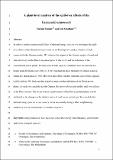Files in this item
A plant-level analysis of the spill-over effects of the German Energiewende
Item metadata
| dc.contributor.author | Mulder, Machiel | |
| dc.contributor.author | Scholtens, Bert | |
| dc.date.accessioned | 2017-09-30T23:38:24Z | |
| dc.date.available | 2017-09-30T23:38:24Z | |
| dc.date.issued | 2016-12-01 | |
| dc.identifier | 246457720 | |
| dc.identifier | d3b72e97-000e-47d5-a081-7fb80cf7dbdc | |
| dc.identifier | 84989196110 | |
| dc.identifier | 000395726400030 | |
| dc.identifier.citation | Mulder , M & Scholtens , B 2016 , ' A plant-level analysis of the spill-over effects of the German Energiewende ' , Applied Energy , vol. 183 , pp. 1259-1271 . https://doi.org/10.1016/j.apenergy.2016.09.056 | en |
| dc.identifier.issn | 0306-2619 | |
| dc.identifier.other | RIS: urn:43992A125A22629F51893B556D42ADCA | |
| dc.identifier.other | ORCID: /0000-0001-5774-5191/work/27162425 | |
| dc.identifier.uri | https://hdl.handle.net/10023/11770 | |
| dc.description.abstract | In order to analyse international effects of national energy policies, we investigate the spill-over effects of the German Energiewende on the Dutch power market, which is closely connected to the German market. We estimate the impact of the German supply of wind and solar electricity on the Dutch day-ahead price of electricity and the utilisation of the conventional power plants. We take cross-border capacity constraints into account and use hourly plant-level data over 2006–2014. We find that the price elasticity of German wind on Dutch day-ahead prices is −0.03. However, this effect vanishes when the cross-border capacity is fully utilised. We find a modest negative impact on the utilisation of the Dutch power plants. As such, we conclude that the German Energiewende has had modest spill-over effects to the Dutch market. The recent dramatic performance of the Dutch gas-fired plants can be attributed to the changes in the relative prices of coal versus natural gas. We conclude that national energy policies in one country do not necessarily strongly affect neighbouring markets in case of constrained cross-border capacities. | |
| dc.format.extent | 13 | |
| dc.format.extent | 1612437 | |
| dc.language.iso | eng | |
| dc.relation.ispartof | Applied Energy | en |
| dc.rights | Copyright © 2016 Elsevier Ltd. This work is made available online in accordance with publisher's policies. This is the author created, accepted version manuscript following peer review and may differ slightly from the final published version. The final published version is available at https://doi.org/10.1016/j.apenergy.2016.09.056 | en |
| dc.subject | Energy transition | en |
| dc.subject | Energiewende | en |
| dc.subject | Renewable energy | en |
| dc.subject | Fuel efficiency | en |
| dc.subject | Cross-border spill-overs | en |
| dc.subject | Transport capacity | en |
| dc.subject | HD Industries. Land use. Labor | en |
| dc.subject | SDG 7 - Affordable and Clean Energy | en |
| dc.subject | SDG 15 - Life on Land | en |
| dc.subject.lcc | HD | en |
| dc.title | A plant-level analysis of the spill-over effects of the German Energiewende | en |
| dc.type | Journal article | en |
| dc.contributor.institution | University of St Andrews.School of Management | en |
| dc.contributor.institution | University of St Andrews.Centre for Responsible Banking and Finance | en |
| dc.identifier.doi | 10.1016/j.apenergy.2016.09.056 | |
| dc.description.status | Peer reviewed | en |
| dc.date.embargoedUntil | 2017-09-30 |
This item appears in the following Collection(s)
Items in the St Andrews Research Repository are protected by copyright, with all rights reserved, unless otherwise indicated.

